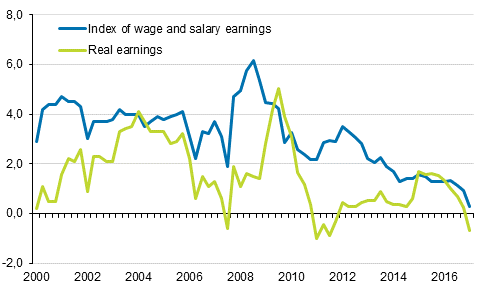Published: 30 May 2017
Wage and salary earners' earnings rose by 0.3 per cent in January–March
Corrected: Appendix table 11
was corrected on 2 June 2017.
Corrected: Appendix tables 5 and 6 were corrected
on 4 June 2018. The corrections are indicated in red.
According to preliminary data of Statistics Finland, the nominal earnings of wage and salary earners rose by 0.3 per cent in January–March 2017 when compared to the respective period in 2016. Real earnings fell by 0.7 per cent compared to the first quarter of the previous year, because the rise in consumer prices was faster than that in earnings level in the first quarter of 2017.
Year-on-year changes in index of wage and salary earnings 2000/1–2017/1, per cent

According to Statistics Finland’s preliminary data, the nominal earnings of wage and salary earners rose in January to March 2017 by 0.8 per cent in the private sector from the corresponding period in 2016 and decreased by 1.1 per cent in both the central and local government sectors. The drop in the public sector was caused by the fact that the cut in holiday bonuses agreed on in the Competitiveness Pact has been taken into consideration in the index of wage and salary earnings. The cut in holiday bonuses has a negative effect on the index of wage and salary earnings in the central and local government sectors starting from the first quarter of 2017.
Wage and salary earners' regular earnings increased by 0.7 per cent in January–March
Regular earnings rose by 0.7 per cent in January to March 2017 from the corresponding period in the year before. The growth amounted to 0.8 per cent in the private sector, to 0.4 per cent in the central government sector, and to 0.3 per cent in the local government sector.
The index for regular earnings describes the permanent change in earnings better than the index of wage and salary earnings as it does not include performance-based bonuses or non-recurring items based on collective agreements that are included in the index of wage and salary earnings. Cuts in holiday bonuses are considered non-recurring items based on collective agreements so they are included in the index of wage and salary earnings but not in the index for regular earnings. These cuts in holiday bonuses lower the index of wage and salary earnings but do not affect the development of the index for regular earnings
Index of wage and salary earnings and index of regular earnings have been revised
The new base year for the index of wage and salary earnings and the index of regular earnings is 2015, indicated by 100 in the new indices. In the publication concerning the first quarter of 2017 the most recent indices of wage and salary earnings have been calculated for the first time with the base year 2015=100. The indices concerning 2016 are still preliminary.
The index of wage and salary earnings has adopted a calculation method for chain index starting from the 2015=100 index. The index is calculated so that an annual earnings development is calculated for each wage and salary earner group compared to the last quarter of the year before and the obtained relative changes are weighted together with the wages and salaries sum weights of the previous year's last quarter. The relative changes in the earnings for each year are chained together so that the overall change of the earnings level is obtained starting from the base year 2015
The chaining point of the indices with old base years is the last quarter of 2015. Thus, as from the beginning of 2016, the development of old indices follows that of the 2015=100 index.
Source: Index of wage and salary earnings 2017, 1st quarter. Statistics Finland
Inquiries: Anu Uuttu 029 551 2322, Harri Nummila 029 551 3235, palkat.indeksit@stat.fi
Director in charge: Reetta Moilanen
Publication in pdf-format (485.8 kB)
- Tables
-
Tables in databases
Pick the data you need into tables, view the data as graphs, or download the data for your use.
Appendix tables
- Appendix table 1. Index of wage and salary earnings 2015=100 by employer sector and base of payment (30.5.2017)
- Appendix table 2. Index of regular earnings 2015=100 by employer sector and base of payment (30.5.2017)
- Appendix table 3. Index of wage and salary earnings 2015=100 by employer sector and gender (30.5.2017)
- Appendix table 4. Index of regular earnings 2015=100 by employer sector and gender (30.5.2017)
- Appendix table 5. Index of wage and salary earnings 2015=100 by industry, (TOL 2008) (Appendix table was corrected on 4 June 2018.) (30.5.2017)
- Appendix table 6. Index of regular earnings 2015=100 by industry, (TOL 2008) (Appendix table was corrected on 4 June 2018.) (30.5.2017)
- Appendix table 7. Index of wage and salary earnings 2010=100 by employer sector and gender (30.5.2017)
- Appendix table 8. Index of wage and salary earnings 2010=100 by industry, (TOL 2008) (30.5.2017)
- Appendix table 9. Index of wage and salary earnings 2015=100, percentage changes (30.5.2017)
- Appendix table 10. Index of regular earnings 2015=100, percentage changes (30.5.2017)
- Appendix table 11. Average earnings by employer sector and gender, EUR/month (Appendix table was corrected on 2 June 2017.) (30.5.2017)
- Revisions in these statistics
-
- Revisions in these statistics (30.5.2017)
Updated 30.05.2017
Official Statistics of Finland (OSF):
Index of wage and salary earnings [e-publication].
ISSN=1798-7814. 1st quarter 2017. Helsinki: Statistics Finland [referred: 19.2.2026].
Access method: http://stat.fi/til/ati/2017/01/ati_2017_01_2017-05-30_tie_001_en.html

